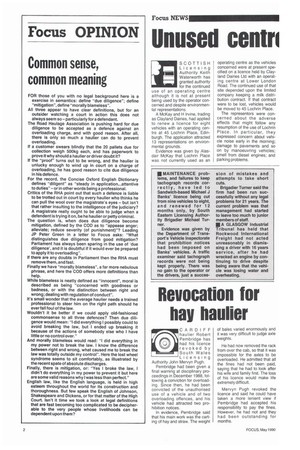Focus OPINION Common sense, common meaning
Page 4

If you've noticed an error in this article please click here to report it so we can fix it.
FOR those of you with no legal background here is a exercise in semantics: define "due diligence"; define 'mitigation'', define "morally blameless".
All three appear to have clear definitions, but for an outsider watching a court in action this does not always seem so— particularly for a defendant.
The Road Haulage Association is pushing hard for due diligence to be accepted as a defence against an overloading charge, and with good reason. After all, there is only so much a haulier can do to prevent overloading.
If a customer swears blindly that the 20 pallets due for collection weigh 500kg each, and has paperwork to prove it why should a haulier or driver doubt it?
If the "proof" turns out to be wrong, and the haulier is unlucky enough to wind up in court on a charge of overloading, he has good reason to cite due diligence in his defence.
For the record. the Concise Oxford English Dictionary defines "diligent" as -steady in application...attentive to duties"— or in other words being a professional.
Critics of the RHA point out that such a defence is liable to be trotted out in court by every haulier who thinks he can pull the wool over the magistrate's eyes — but isn't that rather insulting to the intelligence of the judiciary? A magistrate really ought to be able to judge when a defendent is trying it on, be he haulier or petty criminal.
The question is, when does due diligence become mitigation, defined by the COD as to "appease anger; alleviate; reduce severity (of punishment)"? Leading JP Peter Green in a letter to Focus asks: "What distinguishes due diligence from good mitigation? Parliament has always been sparing in the use of 'due diligence', and it is doubtful if it would ever be prepared to apply it to overloading".
If there are any doubts in Parliament then the RHA must remove them, and fast.
Finally we have "morally blameless", a far more nebulous phrase, and here the COD offers more definitions than help.
While blameless is neatly defined as "innocent", moral is described as being "concerned with goodness or badness, or with the distinction between right and wrong; dealing with regulation of conduct".
It's small wonder that the average haulier needs a trained professional to steer him on the right path should he ever fall foul of the law.
Wouldn't it be better if we could apply old-fashioned commonsense to all three defences? Then due diligence would mean: -I did everything I possibly could to avoid breaking the law, but I ended up breaking it because of the actions of somebody else who I have little or no control over."
And morally blameless would read: did everything in my power not to break the law. I know the difference between right and wrong, what caused me to break the law was totally outside my control". Here the lost wheel syndrome seems to sit comfortably, as illustrated by the recent spate of absolute discharges.
Finally, there is mitigation, or: "Yes I broke the law, I didn't do everything in my power to prevent it but here are some valid reasons why I was less than perfect."
English law, like the English language, is held in high esteem throughout the world for its construction and thoroughness. But few speak the English of Johnson, Shakespeare and Dickens, or for that matter of the High Court. Isn't it time we took a look at legal definitions that are fast becoming too complicated to be decipherable to the very people whose livelihoods can be dependent upon them?
























































































































